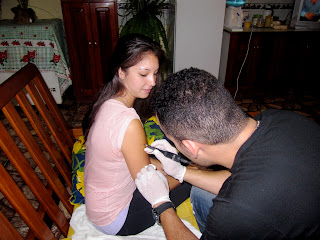Brief History of Paraguay
I came to this country having few expectations and knowing absolutely nothing about it. It turns out Paraguay has a culture rich in history with much potential.
(Disclaimer: All this is from a conversation I had with my host sisters and their friends, and was relayed to me in Spanish, so it may not all be 100% factually correct.)
To make a long story short, Paraguay has a lot of natural resources and was the first country in South America to have a train system, so it was a country with huge potential. But in 1870, South America's bloodiest war occurred, virtually wiping out the population of Paraguay and dwindling a once vast territory down to its current size. Supposedly the territory once spanned all the way over to the Atlantic. (This war is the next biggest after WWI and WWII.) It was a war of Paraguay vs. the Triple Alliance (Uruguay, Brazil, and Argentina). Since Paraguay was outnumbered, it suffered greatly. Women and young boys had to fight in the war because the men were all dead. It is just now finally recovering from that and is up to a population of about 6 million.
Paraguay is also making a comeback as an economic power and is growing at rapid pace. Soy, wood, and meat are Paraguay’s main exports and it is home to the biggest hydroelectric plant in the world (production wise), Itaipú. In the ground beneath Paraguay lies the biggest fresh water reserve in the world, which will likely be in high demand in the coming years. There was a lot of deforestation by Americans in the Amazon here, but Paraguay has created laws to stop deforestation and recover the land.
This year marks the bicentennial of Paraguay's independence from Spain and virtually every other building has a big banner with a red, white, and blue “200” on it, displaying their strong Paraguayan pride. They currently have a democracy but I have yet to have a real conversation about politics with anyone here.
This year marks the bicentennial of Paraguay's independence from Spain and virtually every other building has a big banner with a red, white, and blue “200” on it, displaying their strong Paraguayan pride. They currently have a democracy but I have yet to have a real conversation about politics with anyone here.


Access to ocean ports (rather than river ones) has fueled many wars in South America, and Paraguay and Bolivia, being landlocked, are usually involved.
ReplyDeleteAlso, during the Cold War, Paraguay was one of the many Latin American countries whose brutal dictator (Alfredo Stroessner) had the full support and backing of the United States.
But, just like in Chile with Pinochet, I'm led to believe that a lot of Paraguayans loved Stroessner and the stability and economic progress he brought. It would be interesting to see what your hosts thoughts are and what the general feeling towards that era is.
Hope all is well!